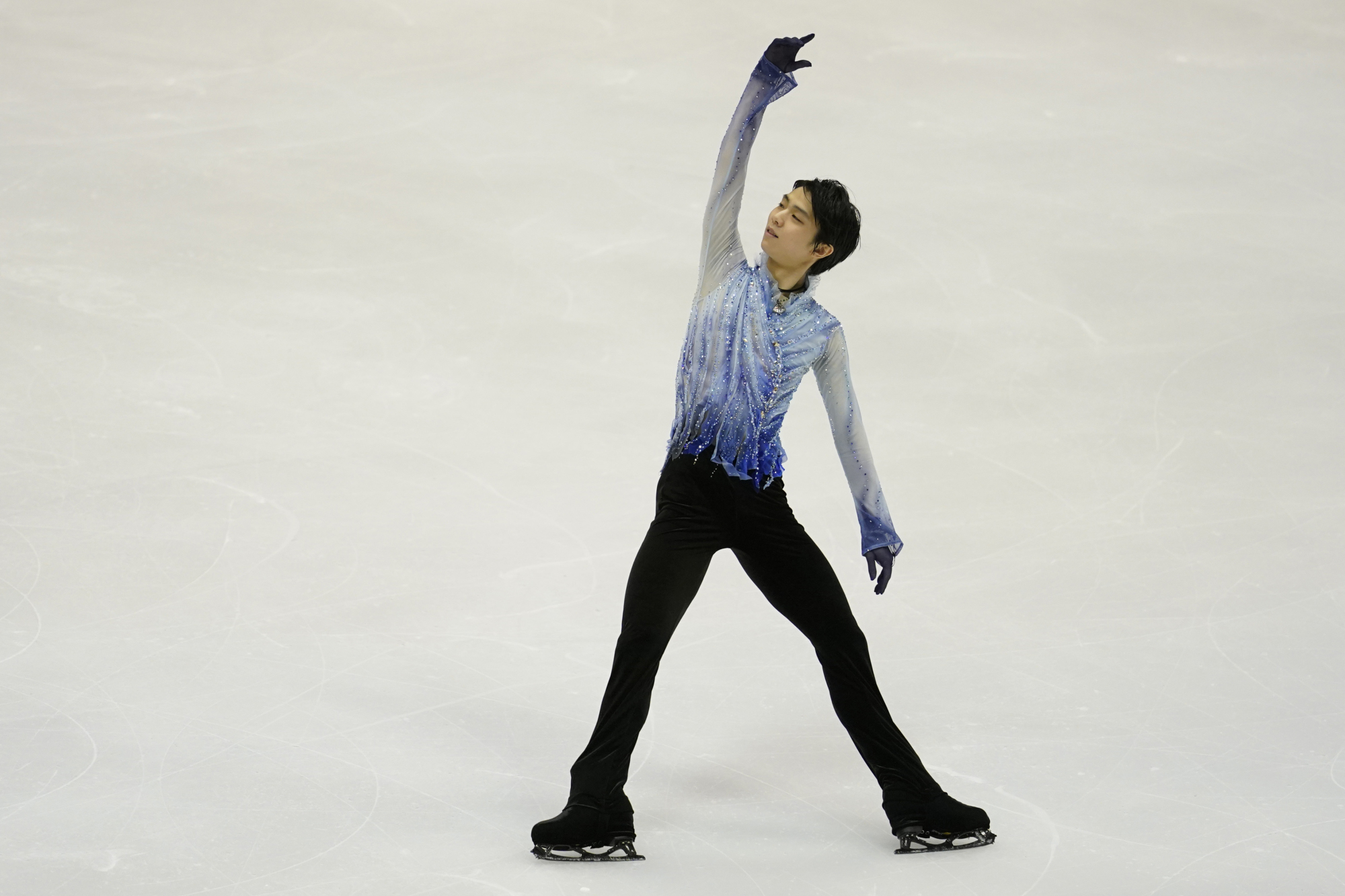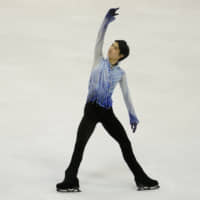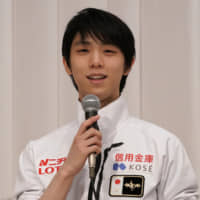Yuzuru Hanyu's destruction of the opposition at the NHK Trophy last weekend came as no surprise. The two-time Olympic champion is fully healthy and back in top form as witnessed by his 55-point victory.
What resonated to me even more than his skating, which was superb as usual, was how well he handled himself amidst all of the demands put on him during the event. There were practices, press conferences, the competition itself, the Gala Exhibition, the closing banquet and much more.
A Grand Prix is a busy time for any skater, but when you are the most famous skater in the world, competing in your own country where you don't train regularly, everything is magnified exponentially.
But Hanyu, who will turn 25 next month, handled it all with the same style and grace we see from him on the ice.
As the superstar spoke before the exhibition on Sunday, with dozens of journalists gathered closely around him, I was impressed by how comfortable he appeared.
The deft way he handled difficult questions, while providing thoughtful answers and injecting humor along the way, reminded me of the press conferences President John F. Kennedy used to have back in the day.
Hanyu was in his element and completely as ease. This is why the media, just like his fans around the globe, find him endearing.
Some athletes go through the motions when it comes to answering questions from the media, or don't speak at all, but Yuzu understands that dealing with reporters is part of his vocation. He always tries to give a sincere reply to an inquiry.
The Sendai native was even willing to reveal his innermost feelings when responding.
Following Friday night's short program, Hanyu was asked the following question by a Japanese reporter:
"Right after today's performance you said that you were nervous because it was the real competition and you felt that you had let it get the better of you. The audience and fans in Japan think of you as being very strong.
"You may feel that you have a weak heart, but do you do something special to create this strong impression of yourself that you project or does it come out naturally?"
"I don't really have a clear answer to that, but I'm also human," Hanyu stated. "When I feel weak or down, then I'm definitely very weak. People have an impression of me that I am a very strong person. I feel that way too. I know that my fans, the people who watch figure skating, expect me to be strong. Sometimes that can create a huge pressure for me.
"But then again, thanks to that pressure, I feel strongly about wanting to be strong," Hanyu continued. "I probably have a lot more pressure on me more times than anybody else."
One of the week's most interesting moments occurred during the same press conference after the short program, when Russian reporter Eleonora Shumilova of sputniknews.com surprised Hanyu with the following query:
"I think you have said before that Russia is where figure skating originated. I'm wondering why you have never chosen to train under a Russian coach?"
"I don't know what the reason is, but I never have," Hanyu replied with a smile. "However, when I first started skating, I think my third program had the title of 'From Russia with Love.' That title was given be my then-coach (Shoichiro) Tsuzuki-san.
"I owe Tsuzuki-san a lot in terms of how I learned figure skating," Hanyu said of the legendary mentor, who is still going strong as a coach in his 80s. "Tsuzuki-san trained in Russia and then brought the coaching foundation for figure skating to Japan, so I think that is a big part of it.
"I also really liked the style of Russian figure skating," Hanyu added. "The way that is expressive. Their attitude toward figure skating, how they're very stoic about the training. I think it is very cool."
Hanyu then saved his best line for last.
"One day I think I would like to learn under a Russian coach," Hanyu remarked.
As I sat there, I immediately thought of how the skating world would be turned upside down if Yuzu decided to train under Eteri Tutberidze someday.
Wouldn't that be something?
In Sunday's session, Hanyu discussed even more about his deepest thoughts.
"When I was nine years old, I had great confidence in myself," Hanyu stated in response to a question. "I mean that I had no fear or anything. I just really enjoyed skating. However, while growing up, I have had to learn social rules and manners, so that I feel I'm boxed in (being held back by the social rules).
"If I have the same feeling of when I was nine, then I will become Yuzuru Hanyu."
Grand Prix Final lineup set
The field is now set for next month's Grand Prix Final in Turin, Italy. Hanyu, a four-time winner of the event, will be up against two-time defending world champion Nathan Chen of the United States, Russia's Alexander Samarin and Dmitri Aliev, France's Kevin Aymoz, and China's Jin Boyang.
Hanyu, with the two highest scores of the season, will enter the GP Final as a clear favorite over Chen. If everything goes according to plan, Hanyu should emerge with his record fifth title.
"For the final I have to get myself into good physical and mental condition due to a lot of movement and the time difference," Hanyu commented Sunday. "I am only thinking about winning this competition. I know that it will be a fight between Nathan and me."
Hanyu addressed the possibility of incorporating a quad lutz into his program in Italy.
"I have been practicing the lutz, but I'm not sure whether I will put it in at this moment," Hanyu stated. "I always control myself, with strategy and health management, so I decide what I want to do for each competition."
Hanyu expressed confidence that he is going about his business the right way.
"I feel that my mental approach is improved because I was calm for Skate Canada," Hanyu noted. "I would like to keep in good condition and have good balance."
Mishin miffed by judging
Legendary Russian coach Alexei Mishin didn't mince words when asked about his feelings on the judging at the NHK Trophy, where his skater Sofia Samodurova finished sixth and behind Japan's three entrants —Rika Kihira (second), Yuhana Yokoi (fourth) and Mako Yamashita (fifth).
"Taking into account how this season has started and also taking into account the dynamics of growing up, I positively assess Sonya's performances at both Grand Prix events," Mishin was quoted as telling Russian news agency TASS, in comments that were translated into English and posted on fs-gossips.com.
"Here, at the Grand Prix in Japan, she did not allow a single breakdown, however, I believe that the biased assessment of 'fully rotated (vs.) under-rotated' deprived her of a real fourth place," Mishin stated. "The strictness of the judges to her jumps can be explained by the fact that the native walls were supposed to help Japanese ladies, who, in the opinion of many experts, were not quite right ahead of her. Because in terms of infallibility, she is simply unique, and in terms of emotionality and charisma — it's 'A.' "
Trouble in Kansai
Last week multiple reports revealed that former Olympic skater Nobunari Oda has filed a lawsuit against veteran coach Mie Hamada for moral harrassment and is seeking ¥11 million in damages.
The 32-year-old Oda claimed he was forced to quit his post as manager of the Kansai University skating club due to his treatment by the 60-year-old Hamada.
The Mainichi Shimbun reported that the university conducted an investigation after Oda's complaint, but found no evidence to support it. Oda stepped down from his position in September.
Ice Time thinks Oda is going to have a tough time collecting on this one.
First of all, Hamada is one of the most respected coaches in the business, with a long track record of success.
Secondly, Oda though popular with skating fans, has made a second career out of acting like a clown on numerous TV shows since his retirement in 2013.
Now you might ask what does that have to do with him possibly being harassed?
Nothing on the one hand, but image and respect are very important in Japan, and when a judge has to decide if there is any merit to Oda's claim, he is going to have to weigh Hamada's spotless reputation against somebody nearly 30 years younger, who hasn't accomplished much since hanging up his skates, trying to assail her methods.





















With your current subscription plan you can comment on stories. However, before writing your first comment, please create a display name in the Profile section of your subscriber account page.